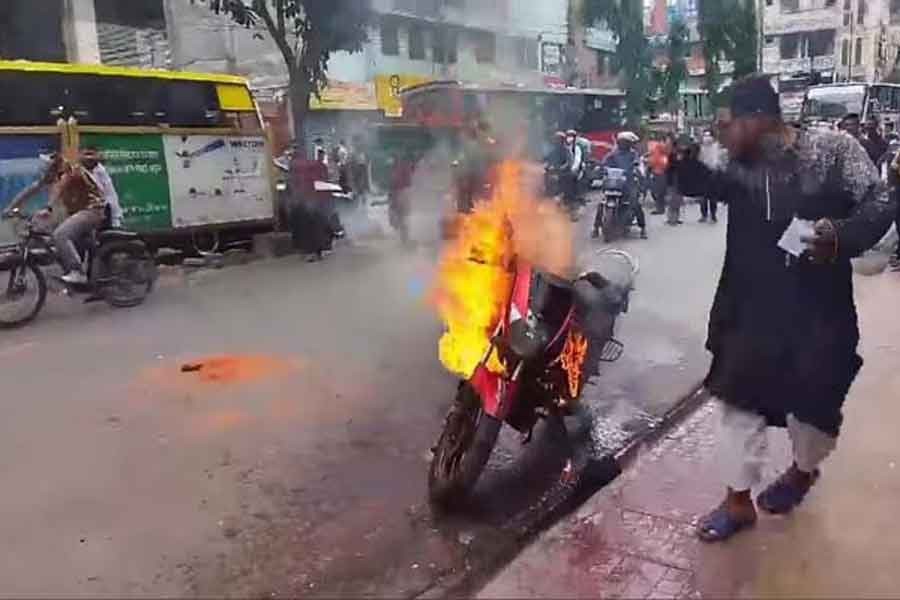
Published :
Updated :

Shawkat Ali set his motorbike on fire. It burned under his watchful eyes and he did not allow any of the onlookers to douse the fire. Thus, the source of his earning was gone. Obviously, Shawkat, the driver of a ridesharing service, was quite frustrated. Apparently, his frustration was aimed at the on-duty traffic sergeant, because he took away his papers for checking. But was it not part of a traffic police's job to see if any vehicle operator is breaking the traffic rules, or if anyone is driving without valid documents? Is this not the way a traffic officer is supposed to ensure discipline on the highway? Shawkat is definitely not a simpleton not to know that. All the bilkers including those operating ridesharing service have similar experience of being stopped, getting their driving licences and other related papers routinely checked or face other related hassles every day. But, so far, we have not heard of any other driver of an app-based ridesharing service lodging her or his protest in such a self-destructive manner. Even in the cases where there is reason for genuine grievance against any traffic police because of their dealing that is heavy-handed or motivated, the vehicle operators usually consider it an occupational hazard. But Shawkat could not stand it. He was too piqued to show that kind of equanimity. His anger boiled over and he exploded. The video clips of his burning motorbike hit headlines in the print and electronic media. On social media, it saw a wild circulation, or saying it in a popular style, it went viral.
Shawkat's incendiary protest was also noted by his fellow rideshare drivers. They staged protests echoing grievances that Shawkat had, but they expressed it in a different manner. Saying that they have their back to the wall, the protesters staged a human chain. They also came up with a set of demands that include due recognition of their service, stopping harassment, valuing their time when on duty as well as modalities of their pays and commissions and an ultimatum on meeting their demands. Even though Shawkat has lost the only source of his livelihood, his desperate act has been a spark that could ignite a bigger protest by his fellow workers. Unknowingly, Shawkat has united his comrades. But how is the trailblazer of all these activities doing at the moment? His family must be in great need of help. For losing his earlier income source as a shopkeeper following the pandemic attack, he might have invested his entire family savings in this last venture of app-based motorbike driving. What will he do now to earn a living? In fact, by burning down his motorbike, the hapless biker has lodged his protest not against any particular traffic sergeant. In truth, it is against entire society that he tried to send a message. But has his message really gotten across? Actually, it is the unfair world at large that was the object of his anger.
At the moment, we know of the misfortune of a particular Shawkat, but not about thousands, maybe millions, of others who lost their livelihoods to the pandemic. The camera on a mobile phone is no doubt an efficient device to make an eye-catching event known to a wider audience than the few eyewitnesses that happen to be at the scene of the incident. And the social media has the ability to take it to the global audience. It is not that the tragedy of a particular person's life so recorded on a mobile-phone camera and sent across the cyberspace has not sometimes been of help to the victim being videographed. In many cases, sympathetic people watching the event on the social media extended a helping hand to the person in distress, or the authorities concerned took note of it and redressed the wrongs done to the victim, if any. But in most cases, the piece of news carried by the video clip is lost in the cyberspace after doing its rounds. And finally, from the memory of the public who watched it. It does not really solve a problem. Worse yet, such practice of passively capturing interesting (!) incidents are often callous and heartless as those running their mobile-phone camera in many cases do it as a fun, not out of any responsibility towards the victim or society at large. The insensitivity of some such camera operators had sometimes been the stuff of the mainstream media reports. One may recall here the tragedy of a man in Japan. That he would be murdered on a particular day was announced earlier by his would-be killers. The entire Japanese media knew it. The assassins went to the victim's residence as they declared before and completed their mission to kill. As usual, the news workers of the media channels-it was before the social media era-went to the scene of murder and captured it on their camera. But no one made any attempt to save the victim from his killers. It provoked outrage across Japan and the world at large.
Evidently, headline-grabbing events may not always evoke desired sympathetic reaction from the public or action for grievance redress from appropriate authorities. As a result, the misfortunes of innumerable Shawkats remain unaddressed. Until and unless society itself becomes proactively, not passively, responsive to the people in need of help, nothing will change. Shawkats will continue to suffer.
sfalim.ds@gmail.com


 For all latest news, follow The Financial Express Google News channel.
For all latest news, follow The Financial Express Google News channel.